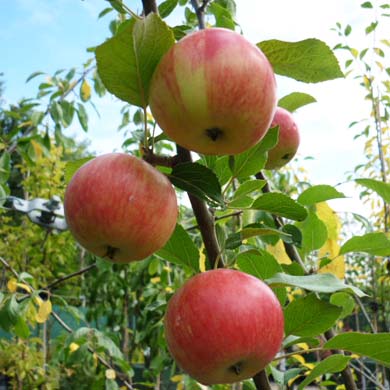Rootstock - Fruit Trees - Information

Most situations will provide good pollination due to the close proximity of other gardens, and will not be necessary to have pollinators if the bees and other pollinating insects are generous with their visits. If there are no other trees close by, then select two varieties in the same flowering group. There are some varieties that are self-fertile. Rootstocks determine the rate and ultimate height of fruit trees. The different types of rootstock suit different soil types, disease and bacterial resistance.
Rootstock Apples, Cherry, Plum, Pear, Quince Trees
M27
Very dwarf. Height at maturity 1.8 metres (4-6ft). This is a first-rate rootstock for those small gardens, and tight spaces. Would be great as pot grown in your favourite container.
M9
Dwarf. Height at maturity 2-3 metres (6-8ft). Favourite rootstock of growers of fruit as it reaches an ideal habit and is useful in small, medium sized gardens. Perfect for containers
M26
Semi Dwarf. Height at maturity 3-4 metres (8-10ft). The most reliable rootstock for fruiting producing a good bush and half standard. Containers can be used if the tree is kept pruned and fertilised
MM106
Semi Vigorous. Height at maturity 4-5 metres (10-13ft). Excellent rootstock producing good bush and half standard trees. Does not need staking and fruits at young age.
MM111
Vigorous. Height at maturity 5-6 metres (15ft). Produces heavy crops.
Colt
Mainly for Cherry Varieties and can grow to 3.5 - 5m tall
Quince A
Rootstock for Pears and can grow to 3-4m tall
Bartlett Seedling
Rootstock for some pears, moderately vigorous, well anchored and adapted to a wide range of soil types
St Julien A
Rootstock for most Plum trees and can grow to 4.5m tall

